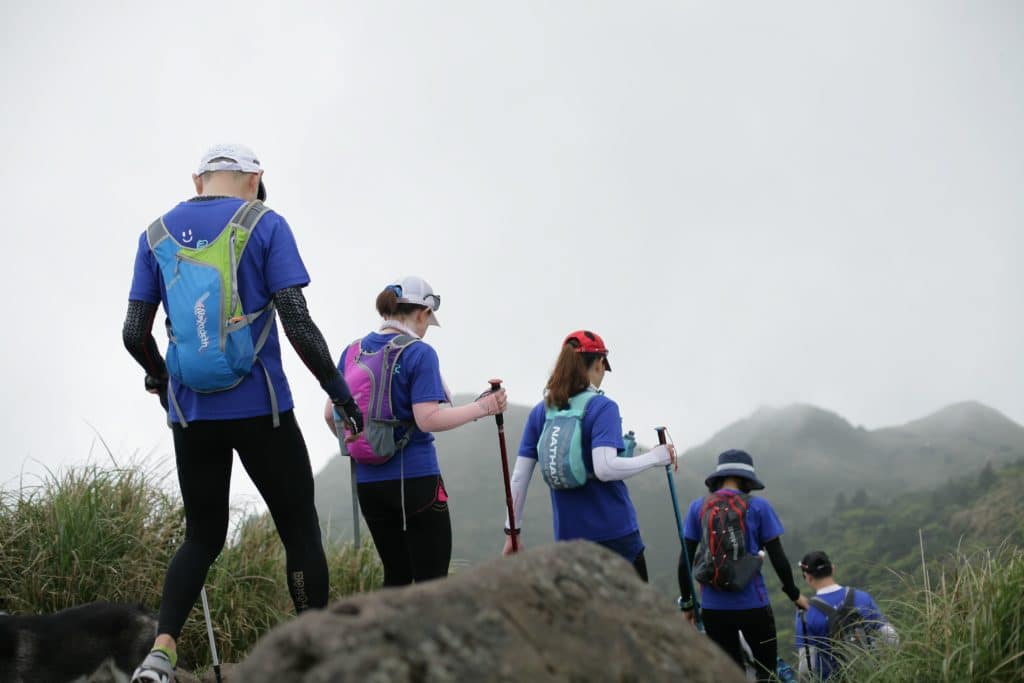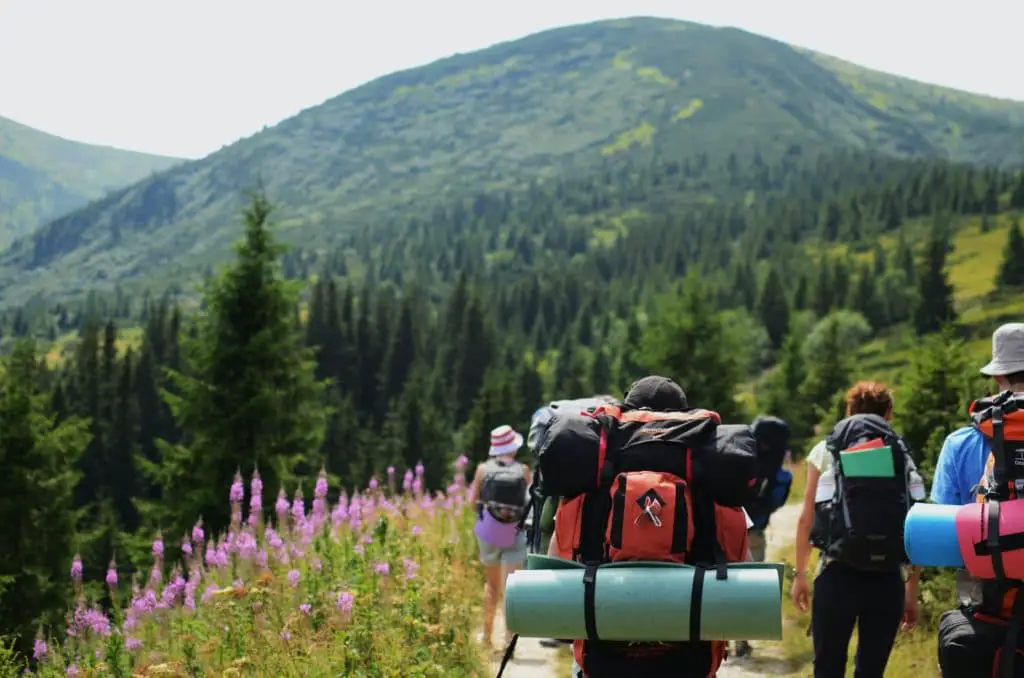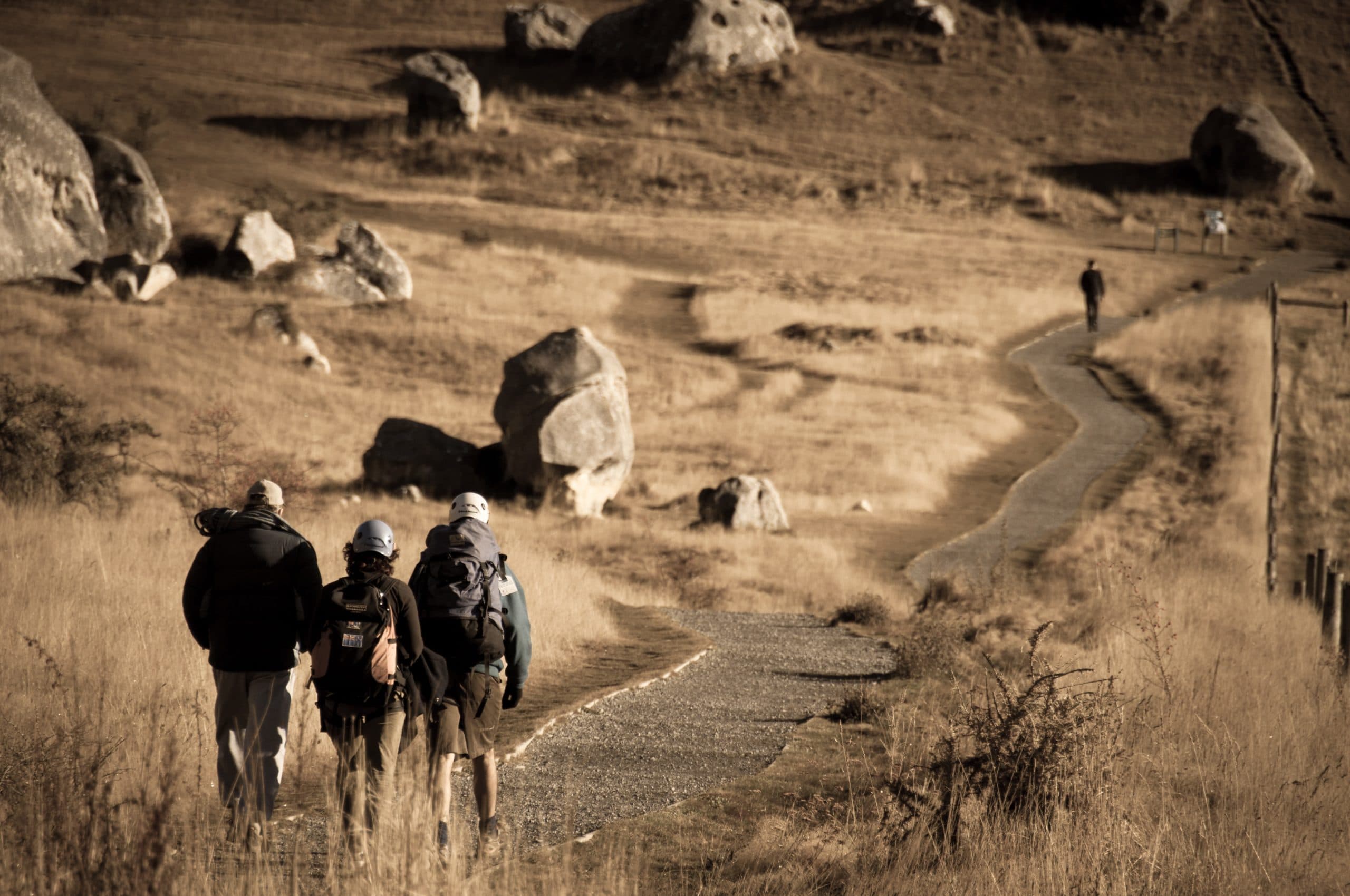Hiking is a great way to get a wholesome workout in the outdoors and if you’ve been thinking about trying out hiking for yourself, I say you should definitely give it a go.
The distance a beginner can cover versus an expert depends on a several factors such as the trail difficulty, physical stamina, weather conditions, and many more.
If you’re looking for a guide on what factors play a role in deciding your hiking speed and how you can improve hiking distance, then you’ve come to the right place. Let’s begin with taking a closer look at how hiking levels are classified.
Table of Contents
How Far can the Average Person Hike in a Day?

The distance that a hiker can cover in one day depends upon many factors. Here’s an idea as to how hikers are usually classified:
- Novice: A novice is a newbie to hiking and since hiking involves walking for long hours, the best pace to adopt would be a slow pace. The ideal terrain is a flat one with minimum elevation.
- Advanced Novice: An advanced novice may have gone on a few hikes with minimum incline but has not yet experienced a difficult terrain. It is possible that they may need to take frequent breaks if the elevation increases.
- Moderate: A moderate hiker goes on hikes more often and has good fitness levels. They are comfortable hiking for at least half a day and are able to handle longer inclines without feeling drained out. Moderate hikers begin to participate in hikes that need more in-depth planning.
- Advanced Moderate: An advanced moderate hiker has taken part in many hikes that last for half a day and he has experience in handling elevations of a few 1000 feet. He has also hiked in different weather conditions and has a better idea of how to prepare oneself for a hike.
- Expert: An expert hiker has hiked on different terrains, in different weather conditions and has a clear idea of how his body works in different temperatures. He is aware of how he can conserve energy and knows when to speed up and when to slow down. Expert hikers usually plan hikes which last for 3-5 days at a stretch.
- The Know-It-All: The super expert hiker takes up challenging trails and is happy to really rough it out in the wilderness. The minimum amount of time that they put in is anywhere between 1 to 3 weeks. They may also conduct classes and workshops on hiking for beginners, or lead a small group of hikers on famous trails.
If you are new to hiking, the distance that you will be able to cover will naturally be less. On the other hand, starting out slow and building up speed over time is a better idea as that leads to fewer injuries. A new hiker is usually able to cover a distance of 2.5 to 3.5 miles per hour. Walking for around 3 hours together means that a minimum distance of 8 miles can be covered. That is the distance you should aim at covering as a first-time hiker, with breaks in between of course.
Factors that Affect Hiking Distance
Body Weight
Your body weight greatly impacts the distance that you cover on a hike and the speed at which you are able to walk. It’s a known fact that lean fit hikers are able to cover long distances without feeling tired or breathless. On the other hand, overweight people will need more frequent breaks while hiking and will not be able to adapt as quickly to changes in weather conditions. They are also more prone to injuries and recovery may be slower. Carrying a heavy backpack will also slow down a hiker’s pace further.
Fitness
Hiking is basically walking for long hours at a time on different sorts of terrain. Fit people who practice other forms of physical activity will be better adept at elevations and hiking through rough terrain. Since hiking requires tremendous stamina, it is advisable to add strength training workouts to your exercise regime as well. Hikers who are fit are less prone to injuries too.
Terrain
The terrain that you choose to hike on will have an impact on your speed. Ironically, when you’re hiking, walking down a slope or incline can be the trickiest because hikers have to ensure that they maintain their balance, while carrying the backpack. Flat terrains are the easiest to cover and are highly recommended for beginners. Trails that have waterbodies or forests will also need more time to cover.
Hiking Duration
As a beginner, hiking as a start for 2- 3 hours is recommended. However, the distance that you cover and your speed depends upon the duration of the hike as well. If you hike for many hours at a time in a single day, it is only natural that you will be hiking at a slower pace the next day. The opposite is true for experienced backpackers as they are used to walking long distances with a backpack at an optimum speed.
Weather
The climate and weather conditions that you will encounter on your hike play a very big role in determining speed and distance covered. On certain trails, the weather on some days is likely to change quickly and hikers have to be prepared for that beforehand. Walking long hours in the sun will leave you dehydrated and walking in the rain or in winter is just as tough. The optimal weather condition is one where the weather is not too hot or too cold.
Make sure to also check on the wind speed before you start your hike. To learn more, check out our article on what wind speed is dangerous.
Hiking Season
Hiking season usually refers to a few months in the year when the weather is fairly good for long hikes. That’s why even experienced hikers always take into account weather conditions for a few months and not just on one day. Beginner hikers should consider hiking in the summer when the weather is more pleasant although hiking in the winter in the morning is also a good option because you’ll still get a minimum of 6 hours of sunlight.
Trail Altitude
The best hiking trails around the world are usually at a higher altitude. Higher the altitude, the faster your body will need to adjust to decreasing oxygen levels. Hiking at high altitudes or even slightly higher altitudes is not advised for beginners. If covering as much distance as possible is the goal, then trail altitude will slow you down. Factor in an extra one hour to one and a half hours for every 2000 feet of altitude, on the hike.
Backpack Weight
Packing your backpack right is truly an art and it usually takes a few hikes for a hiker to understand what is really needed for a hike. The weight of a hiker’s backpack and gear has a huge impact on the number of miles that can be covered. Understanding how much extra weight or load your body can carry, while still being able to walk is crucial to a successful hike.
11 Tips for Increasing Distance

1. Jogging and Running
Jogging and running are great cardio activities that have been proven to help in building endurance. They help you to regulate breathing while working out which will prove handy especially when climbing inclines. Try to begin with half an hour of jogging or running and alternate that with brisk walking. Slowly increase your workout time.
2. Leg Strength
Having stamina and strength is so important for a hiker. The stronger your legs, the more weight you will be able to carry in your backpack and the more distance you will be able to cover. Cardio is a good way to build leg strength but weight training is a good add-on too. Pushups, kettlebell exercises, lunges and squats are a few easy to do workouts that can be done anywhere. Focus on fewer counts and more reps.
3. Practice On Inclines
Once your body has become adjusted to strength training, turn it up a notch by working out on steep gradients or inclines. That will give you an idea of how a real hike will feel like. If you’ve found a good incline, I suggest carrying your actual backpack gear and practicing how to walk with it, especially up an incline or a steep hill. With practice, you’ll find hiking up a hill much easier on your trail.
4. Breathing Exercises
Breathing through your mouth should be avoided while hiking. A fit person will be able to maintain a steady breathing rhythm by taking in deep breaths at a time without the need to take frequent breaks. Breath control is very important especially when you’re at a higher altitude and taking deep breaths can help you maintain your pace too. Do breathing exercises that require you to take in as much oxygen as you can pull into your lungs, every day. Make sure you tighten your stomach with each exhalation.
5. Toughen Your Mind
Experienced hikers will tell you that hiking pushes one mentally to the extremes. Trails can often be unpredictable and no matter how well prepared you may be, unexpected challenges can crop up. One of the best ways to prepare for that is to challenge your body and mind in unexpected ways. Athletes often train in harsh weather like running in the rain as a part of toughening the mind up. When you are confident of pushing your limits, you will be able to reach your goals easily.
6. Eat Right
Even if you’re a beginner, taking in the right nutrition is so important. If you plan on going for longer hikes and conquering tougher trails in a few months, then I suggest seeing a nutritionist who can chart a diet plan exclusively for you based on your requirements. A diet that has an adequate amount of healthy carbohydrates, protein and fats is important for building strength. Don’t forget to keep sipping water every hour and if you are into longer strength training routines, then consider including a protein shake and electrolyte based sports drinks.
7. Foot Care
One aspect of hiking that hikers usually don’t talk about is that long walks can result in tired feet and in painful blisters. The right way to prepare for walking at a stretch for hours is to apply a lubricant or salve on your feet first with special focus on the balls and soles of the feet. Apply blister block pads to those areas and ensure that you wear double layered socks. Some hikers prefer to bandage up their feet with sports tape for better grip. A massage at the end of the day with a foot cream will help relax tired feet.
8. Pack Lighter
Packing a backpack properly takes practice and by taking only the most important essentials, you can help to ease the load off your body and feet. Even if the load is reduced by 15-20%, it can help a hiker walk faster and endure lesser fatigue. Besides that, it is also important to wear shoes and clothes that don’t weigh much. There are many great brands that have lightweight shoes specifically meant for hiking and I highly recommend them. Investing in good footwear and accessories, will last you for years.
9. Waking Up Early
Once the sun is up, you are likely to find it harder to cover long distances in the heat. The best time to cover maximum distance is at dawn as that will really give you a heads-up. The weather conditions also play an important part in determining how much sunlight you’ll get as you’ll find that during autumn and winter, daylight hours are naturally fewer.
10. Use Hiking Poles
Hiking poles are your best friend when you’re on a hike because they give you a physical boost when you need one the most. They help you to have better balance and also simultaneously reduce the stress on the back, knees and joints. Hiking poles are a must on uneven terrain and are great for navigating puddles and muddy waters when you want to analyze its depth. They help you to maintain a steady pace and also minimize the possibility of injury.
11. Planning Ahead
A little bit of planning can go a really long way in helping you complete your hikes at your desired time and pace. For beginners, I recommend choosing a few trails that are relatively flat and easier to complete in a shorter duration. If you are planning to hike alone, then studying a map of the trail the night before will give you an idea of which is the best route to take. By deciding which points you want to reach at a specific time of the day beforehand, you will be able to complete your hike on time. By setting small goals, you’ll also feel a sense of achievement.
What is a Good Distance to Aim for if You are a Beginner Hiker?
In order to really enjoy a hike, you need to be honest with yourself about how much distance you can cover comfortably, keeping in mind all the factors I have mentioned earlier in the article. Expert hikers say that a hike that covers a distance of 3- 5 miles is the ideal hiking trail for a beginner. Covering this distance should ideally take two hours or less assuming that you are walking at a steady pace.
Ideally, a beginner should stick to going on at least 3-4 hikes which are in the five-mile range before increasing the distance.

